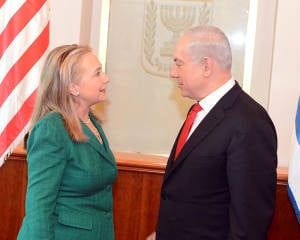In an interview with the New York Daily News, Democratic presidential candidate Hillary Clinton discussed her views on Israel, claiming she will show strong support for the Jewish state. There were, however, episodes in her past that raise questions as to how she will really treat Israel if elected president.
The New York Daily News Editorial Board interviewed Democratic presidential candidate Hillary Clinton over the weekend in their offices in downtown Manhattan, during which she touched on a broad array of issues, including her relationship with Israel and her policies in the Middle East.
Clinton restated her staunch support for Israel, while saying she disagreed with Israel’s leadership on several issues.
The Daily News asked Clinton about her position about the so-called “settlements,“ the Israeli communities in Judea, Samaria and parts of Jerusalem.
Citing the stances held by previous administrations, she said that “settlement expansion” is “not helpful in the context of the continuing American interest in helping to bring the parties together to try to achieve a two-state solution to the conflict,” meaning she opposed further Israeli construction in these contested areas.
However, she stressed her “long history and a personal commitment to Israel’s security and to its future that I have been outspoken about, that I have been stalwart and strong in every way.”
She recounted how when she was secretary of state “the effort to try to work to support a peace process was one that I took seriously,” while she had “very frank and open conversations” with her Israeli counterparts.

Former US Secretary of State Clinton and Netanyahu in Jerusalem after her meeting with Palestinian officials in Nov. 2012. (Matty Stern/U.S. Embassy Tel Aviv/FLASH90)
“I think that’s what you’re supposed to do with people who you respect and who you’ve known for many years as I have known Prime Minister Netanyahu and, before him, Prime Minister Olmert and Prime Minister Barak and Prime Minister Rabin and many of the other major players. I am a friend, and I would not be much of a friend if I did not share my opinions, which I have done, and believe me it has been reciprocated,” said Clinton.
“But I think any disputes or disagreements should be handled in a respectfully and preferably private way, so we don’t give any aid and comfort to Israel’s adversaries or drive any wedges between us,” Clinton underscored.
She vowed to continue to ensure that Israel has a qualitative military edge, to do “anything and everything” for Israel’s security and that she will continue to speak out against the anti-Israel BDS (Boycott, Divest, Sanctions) movement, which she said is “one-sided, discriminatory and unfair,” points she focused on in her AIPAC address last month.
Furthermore, she said she would support Israel in the United Nations or any other international tribunal, “as I have in the past.”
She has previously voiced her opposition to a resolution at the UN Security Council that would condemn Israel, ostensibly in an effort to jumpstart the stalemate diplomatic process with the Palestinians, a move Obama reportedly supports and is working towards.
“So settlements is a piece of this, and it isn’t helpful, but that is a piece of a much larger set of policies that I’m committed to,” she said.
Clinton has accumulated considerable political experience with regard to Israel, as first lady, senator and secretary of state.
She spent numerous hours in meetings with Israeli leaders and has been at the forefront of pro-Israel legislation in the Senate.
In 2012, in a visit to Israel while serving as secretary of state, Clinton said that “protecting Israel’s future is not simply a matter of policy for me, it’s personal. I know with all my heart how important it is that our relation goes from strength to strength.”
However, there were some controversial moments throughout her career which have cast doubt on the firmness of her pro-Israel position.
“I’ve known Bibi a long time and I have a very good relationship with him, in part because we can yell at each other, and we do,” she told CNN last year. “And I was often the designated yeller.”
In 2010, after the US claimed an Israeli announcement over new housing plans in Jerusalem “embarrassed” Vice President Joe Biden, Clinton called Netanyahu and, for the next forty-five minutes, berated him in, what the Washington Post called, “unusually undiplomatic terms.”
By: Max Gelber, United with Israel
